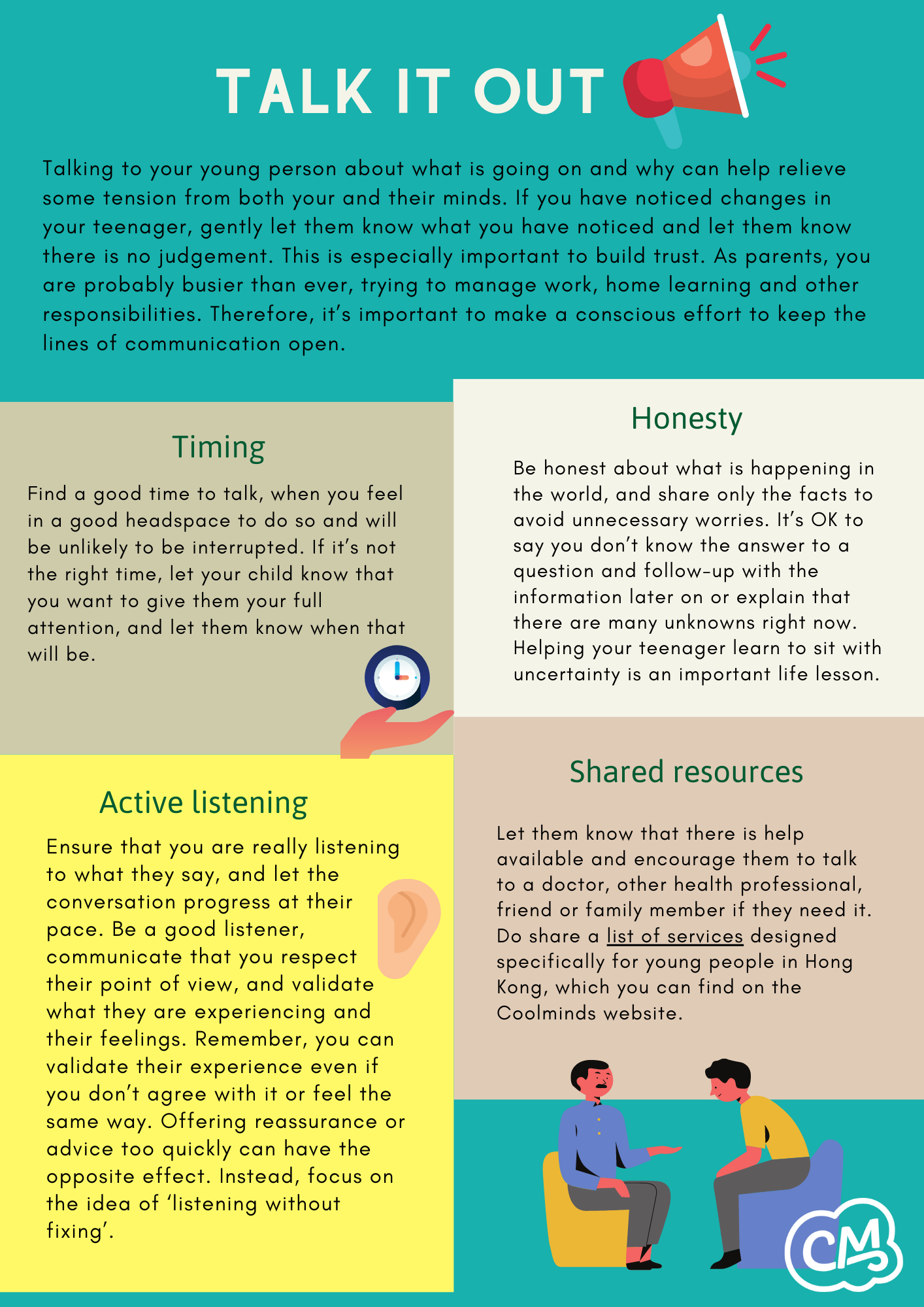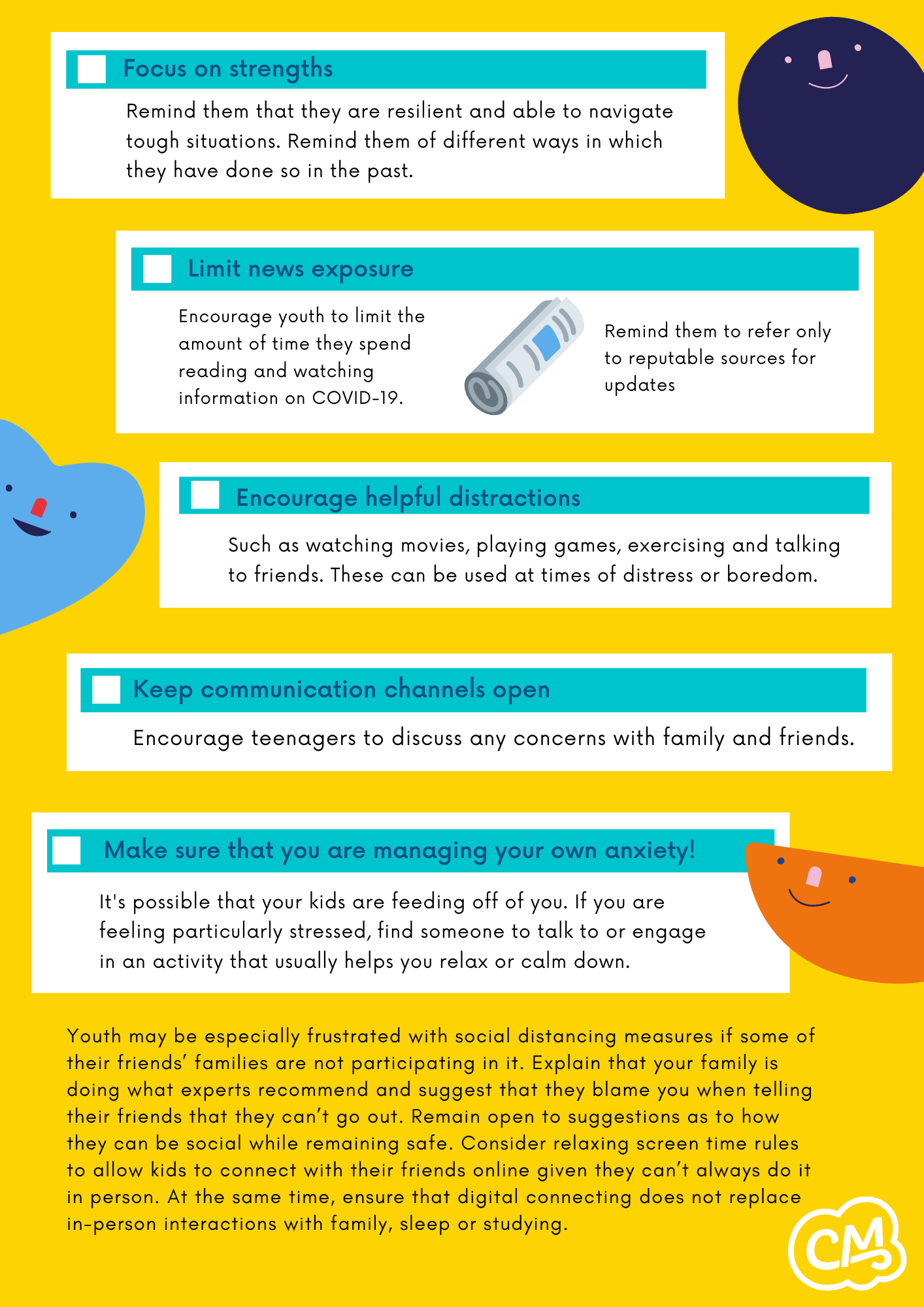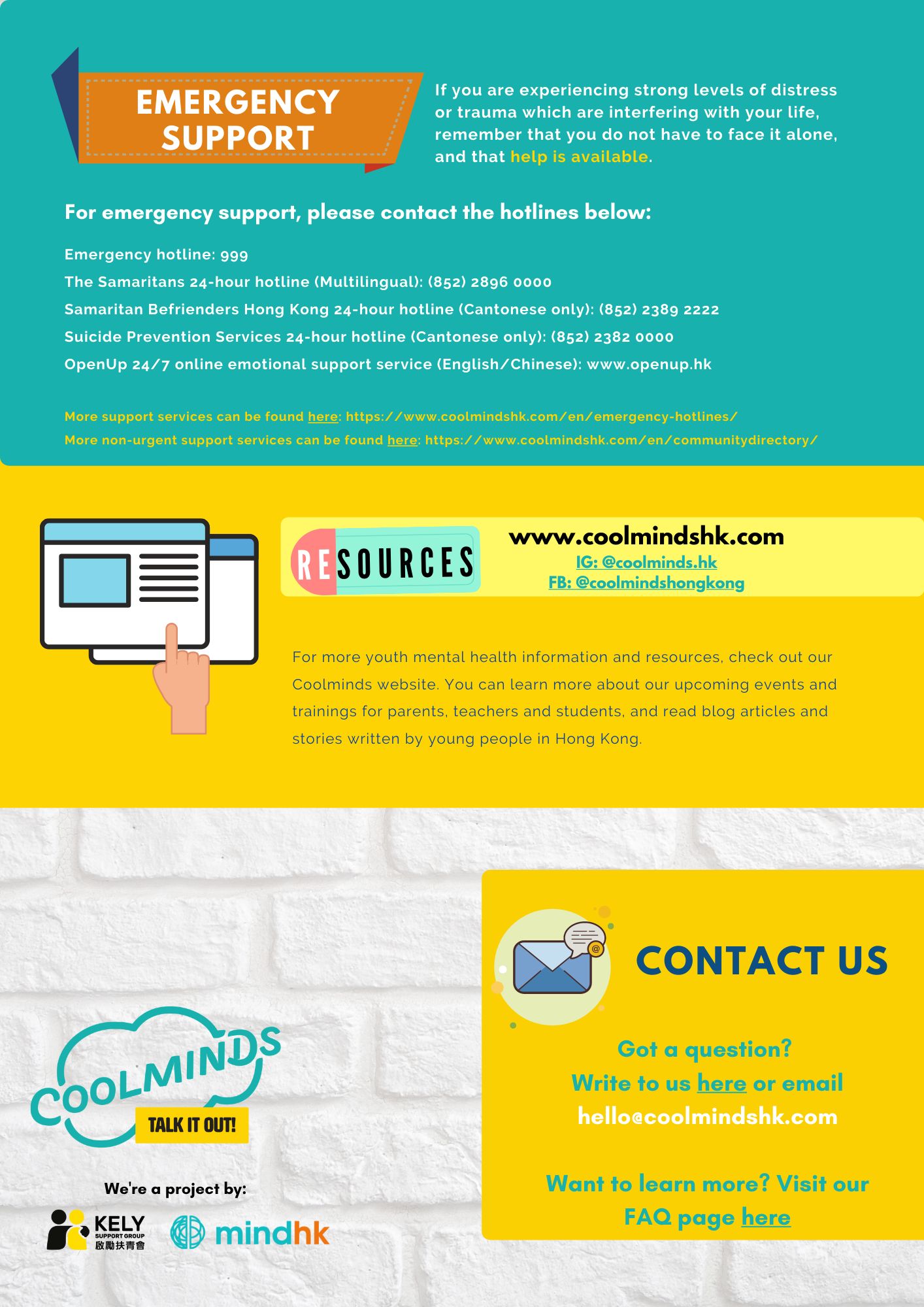Efforts to stem the spread of COVID-19 through public health measures such as social distancing and self-isolation have taken a toll on Hong Kong’s youth. With prolonged school closures, many youth have increased their screen time and reduced their physical activity as well as face-to-face social interaction, which can contribute to low mood and loneliness. Changes in routine combined with the anxiety and stress associated with a new and unknown virus can lead to changes in behavior.
As a parent, it may be stressful to take care of both your own and your children’s mental health and wellbeing. This booklet aims to discuss how you, as a parent, can support your kids as well as yourself during these difficult times.
Talk it out
Talking to your young person about what is going on and why can help relieve some tension from both your and their minds. If you have noticed changes in your teenager, gently let them know what you have noticed and let them know there is no judgement. This is especially important to build trust. As parents, you are probably busier than ever, trying to manage work, home learning and other responsibilities. Therefore, it’s important to make a conscious effort to keep the lines of communication open.
Timing
Find a good time to talk, when you feel in a good headspace to do so and will be unlikely to be interrupted. If it’s not the right time, let your child know that you want to give them your full attention, and let them know when that will be.
Honesty
Be honest about what is happening in the world, and share only the facts to avoid unnecessary worries. It’s OK to say you don’t know the answer to a question and follow-up with the information later on or explain that there are many unknowns right now. Helping your teenager learn to sit with uncertainty is an important life lesson.
Active listening
Ensure that you are really listening to what they say, and let the conversation progress at their pace. Be a good listener, communicate that you respect their point of view, and validate what they are experiencing and their feelings. Remember, you can validate their experience even if you don’t agree with it or feel the same way. Offering reassurance or advice too quickly can have the opposite effect. Instead, focus on the idea of ‘listening without fixing’.
Shared resources
Let them know that there is help available and encourage them to talk to a doctor, other health professional, friend or family member if they need it. Do share a list of services designed specifically for young people in Hong Kong, which you can find on the Coolminds website.
Missed opportunities + Handling grief
Young people will likely face a lot of disappointments during this time such as missed school, parties, graduation, visiting universities, sports, and competitions for which they have prepared. As some of these are important milestones, it’s crucial to acknowledge these losses and the impact they have.
Let them know that it’s OK to feel angry, sad and frustrated, this may actually help them accept the disappointment.
Reassure them they are not alone and that, during this confusing time, many have been impacted and are also grieving for the losses caused by the pandemic.
Missing out on these types of events can also cause anxiety and low mood, so it is important to be on the look-out for that.
Here are some tips to help your young person cope with these losses:
- Stay connected
Find ways for them to stay connected to their friends. You may consider relaxing screen time rules to allow for this.
- Engage in personal expression
Journaling, drawing, painting, playing music, and dancing among others.
- Practising self-care
Ensure they get enough sleep and exercise, consider introducing meditation and/or yoga.
- Challenge negative thoughts
Reframe negative thoughts that might be out of proportion with less extreme and more realistic ones.
- Enjoying the wins
Some aspects of the situations such as missing classes they don’t like or activities they do not enjoy may be welcomed at this time, allow them to appreciate and celebrate these small “wins”.
- Continue the conversation
Don’t just check-in once, do so periodically as feelings and thoughts may change.
You might also feel a sense of sadness and grief at missing important milestones in your children’s lives. It is important to take the time to recognize your own disappointment and practise self-validation by acknowledging that these feelings are fair and valid despite seemingly bigger issues in the world. Take the time to grieve for these losses.
Youth mental health
It is important to understand that the measures we have to use to protect us from COVID-19 can impact our mental health. The fear of getting infected, uncertainty about the future, and all of the changes we’ve made to our routines can cause feelings of anxiety, while social distancing measures can lead to feelings of isolation and low mood. This is true for all of us and even more pronounced for those who have struggled with their mental health before the outbreak. It is therefore important to pay attention to your child’s mental health and wellbeing.
Normalise anxiety
Explain to them that anxiety is a natural feeling to have when there is a threat present, as is the case right now.
Discuss their perspective on the dangers involved and ensure that they are not overestimating the gravity of the situation or underestimating their ability to take care of themselves and manage difficult things.
Focus on strengths
Remind them that they are resilient and able to navigate tough situations. Remind them of different ways in which they have done so in the past.
Limit news exposure
Encourage youth to limit the amount of time they spend reading and watching information on COVID-19.
Remind them to refer only to reputable sources for updates.
Encourage helpful distractions
Such as watching movies, playing games, exercising and talking to friends. These can be used at times of distress or boredom.
Keep communication channels open
Encourage teenagers to discuss any concerns with family and friends.
Make sure that you are managing your own anxiety!
It’s possible that your kids are feeding off of you. If you are feeling particularly stressed, find someone to talk to or engage in an activity that usually helps you relax or calm down.
Youth may be especially frustrated with social distancing measures if some of their friends’ families are not participating in it. Explain that your family is doing what experts recommend and suggest that they blame you when telling their friends that they can’t go out. Remain open to suggestions as to how they can be social while remaining safe. Consider relaxing screen time rules to allow kids to connect with their friends online given they can’t always do it in person. At the same time, ensure that digital connecting does not replace in-person interactions with family, sleep or studying.
Don’t forget to give them time and space! Youth still need their privacy and alone time, especially with the increased togetherness created by working from home and no school. Don’t take it personally if they prefer to spend more time in their room, and do not give them a hard time about it as long as they are completing their school work and other responsibilities.
Self-care
Remember, in order to take care of your young person well, you need to take care of yourself first. Working from home or the office and trying to manage youth at home as well as home learning is hard. You may not be as efficient as you normally are. You may also feel you are not being the best parent you can be.
Be kind to yourself and give yourself a break, everyone is learning to navigate this new way of life, and it takes time to adapt and get things right. Keep in mind that spending more time together is not the same as the quality, focused time you probably have when you and your young person are accomplishing daily tasks separately.
Some self-care ideas include:
- Make time to switch off from responsibilities and duties every day. Read a good book or watch TV.
- Allow only a certain amount of time each day to learn about COVID-19 updates from reputable sources.
- Engage with family and friends on the phone, Facetime, Zoom, Whatsapp, etc.
- Schedule a date night with your partner or quality time alone with a friend at least once a week.
- Practise mindfulness. There are many free apps available to support mindfulness if you are unsure of how to do it.
This is also a time of uncertainty with regards to jobs and financial stability, which can cause high levels of stress and anxiety. Seek support from family and friends where possible. There are also some government sources that can be helpful.
Physical health
Exercise can boost our immune system but it also boosts our mood, our concentration, our confidence, and improves our sleep. Encourage your young person to engage in some form of physical activity every day. It is equally important for parents to do the same. This can be an opportunity to spend fun, non-stressful time together.
Get outside! Go for a run, bike ride or long walk. Take advantage of the many free exercise videos available online and through apps. Play video dance games and use virtual sports simulators. Use what you have in the environment around you to engage in physical activity. Getting your endorphins flowing will be beneficial for everyone.
It is also important to maintain a consistent sleep schedule to ensure you and your child get enough rest. Try your best to eat a healthy diet and drink plenty of water.
Home Learning
Home Learning is challenging for youth, parents and teachers alike. There are equipment and internet requirements to successfully engage in home learning. If you do not have access to these resources, talk to your school about how they can help you and your teenager accomplish what you need.
It is important to remember that your teenager is probably a lot more capable than you realise and can manage much of what they need to do on their own. Make sure to give them that credit and the opportunity to show you that they can do it.
Helpful tips: Routines & Schedules
- Draft a daily schedule together – make sure to get your teenager’s input instead of directing them. Empower them to be responsible for their time, which should allow them to get their school work done in addition to being “social” and engaging in other activities that are important to them.
- Try to use non-controlling, non-directive language to ensure teenagers are accomplishing what they need to, while communicating that they are still in control of their time. A good example of that is asking, “what is your plan today?” Agree on an amount of checking-in that is acceptable to both you and your youth. One idea is to schedule a window of time each day to check-in and provide any assistance that may be needed.
Try not to get stuck in thoughts about how you think youth will react and notice how they are managing. If they are acting more maturely than they have in the past, give them the autonomy to manage on their own accordingly.
Remember that most youth around the world are in a similar position. Your kids will most likely not be further behind others because of home learning. In addition, teachers are experts at managing such situations. They will help your child catch up when school resumes if necessary. For those who have kids graduating from secondary school or University, keep in mind that this is a global pandemic. Universities and employers are fully aware of the challenges faced during this time and the resulting repercussions for everyone. Keep in mind that this is not forever, kids will go back to school!
Use the extra time well!
Although the situation is far from ideal, families rarely get to spend this much time together so do not forget to enjoy it! Make time to do fun things together that you normally don’t have the time to do such as cooking, baking, playing board games, teaching a new skill, etc.
Give your closets and cabinets a good clear out, and donate things you no longer need to charity. Take the time to learn a new skill yourself. Take online classes if you are interested in a career change or to support your current line of work.
Most of all remember to look after yourself and your kids. Your mental and physical well-being are more important during this time than getting all of the school work done or being an exemplary employee. If you are feeling financially unstable, make use of government resources. If you or your kids are not able to maintain good mental health during this time using the suggestions provided, it’s important to seek professional help.
Emergency support
If you are experiencing strong levels of distress or trauma which are interfering with your life, remember that you do not have to face it alone, and that help is available.
For emergency support, please contact the hotlines below:
Emergency hotline: 999
The Samaritans 24-hour hotline (Multilingual): (852) 2896 0000
Samaritan Befrienders Hong Kong 24-hour hotline (Cantonese only): (852) 2389 2222
Suicide Prevention Services 24-hour hotline (Cantonese only): (852) 2382 0000
OpenUp 24/7 online emotional support service (English/Chinese): www.openup.hk
More support services can be found here: https://www.coolmindshk.com/en/emergency-hotlines/
More non-urgent support services can be found here: https://www.coolmindshk.com/en/communitydirectory/











